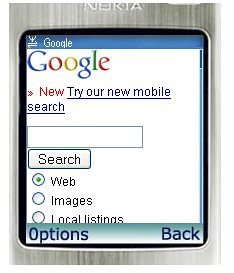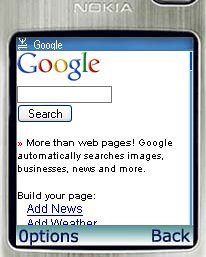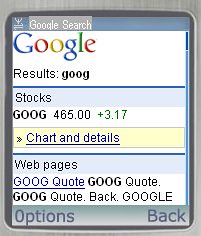Google just launched its new mobile search engine in reply to Yahoo!’s OneSearch. If you go to the mobile version of Google, you’ll see this message:

This is what the new homepage looks like :

It’s just one search box. Users need to type in their query, and Google will automatically categorize them in “Web results”, “Images”, “News”, “Local results” etc.
For example, if I search for “britney”, Google will show images of the pop star first:

If the user searches information about a company and searches for a ticker, it will display this:

In this new version of Google, web results and mobile results are not separated, but mixed together. Google seems to be choosing which result (from their web index or their mobile index) to show depending on the search query.
This is what they say about this on their help page:
Google mobile web search can display different types of web sites:
– Webpages specifically designed for mobile devices will be displayed as is, and are identified by a phone icon.
– Webpages not specifically designed for mobile devices will be formatted by Google so that the pages will display on your mobile device. During this process, Google analyzes the original HTML code to get a sense for the page layout. In order to ensure that the highest quality and most useful web page is displayed on your mobile device, Google may alter images, text formatting and/or certain aspects of web page functionality to make it suitable for viewing on your device.
Users also have the ability to build their own mobile homepage, in order to add news, weather, Slashdot feeds etc:

It only took a few days for Google to reply to Yahoo! in the mobile search battle. We yet have to hear an announcement from Google to see if this is a beta version or not. I guess it’s now Google’s turn to compare itself against Yahoo! 🙂
UPDATE: A post has just been posted on the Official Google Blog to announce the new mobile search engine.






